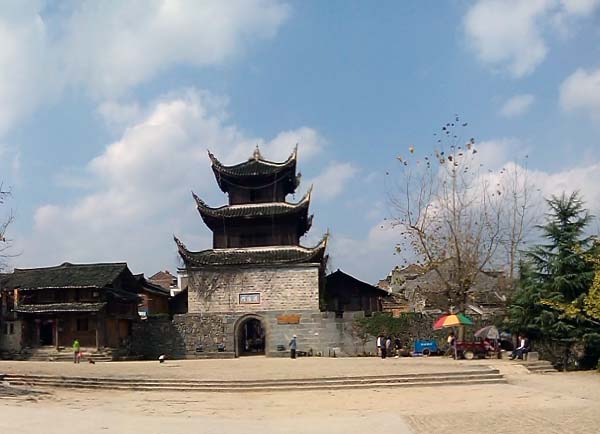- XML
- Sitemap
- Email: guizhoutravel@hotmail.com
- ABOUT US
- CONTACT US



Ancient Town of Longli
Description
Located in the southern part of Jinping County, Guizhou Province, on the eastern edge of the Yunnan-Guizhou Plateau, the ancient town of Longli is a well-preserved military castle which once housed a Qianhusuo (a regiment of 1,000 soldiers) dating to the Ming Dynasty (1368-1644). The town‘s creation resulted from the central regime‘s expansion to far-flung lands and the Central Plain‘s cultural assimilation of ethnic minorities. Today, 21 kilometers from the Liping Airport, Longli is an important passage linking Jinping to the Liping Dong Villages Scenic Area.


Lying in the central area of a mountain basin, Longli is on flat terrain, with the Longxi River winding its way northward in the west. Surrounded by mountains and covered with luxuriant trees, the area boasts a vital ecological environment and abundant forests.

According to historical record, Longbiao County was established in 624. Then and now, the place was and remains a town of rich production, abounding in rice, rapeseed oil, watermelon, firs and gold. First as an ancient military fortress, Longli Town was established in 1386 and renovated in 1404, its city wall built of earth. In 1457, cobblestones were used to further frame the town, thus its current aesthetic took shape. The existing city layout and its historic homes still retain their original appearance. In Longli, still today homes line the streets in good order, all comprising three rooms, including two bedrooms. The blue-tile roofs are further decorated with turned-up eaves and ridges oft time in the form of animals. Floors are paved with stone slabs and walls are adorned with color murals. In front of the gates is a stone stair of three steps. The houses are surrounded by brick walls to separate the home from outside and shelter it from wind.
Entering a home‘s gate, one will first see a building of three rooms, behind which is a common courtyard. A blue-stone vat is put in the central area to store water as fire contingency. Behind the courtyard is the main house, impressive with exquisite structure, gorgeous decorations and window carvings in the shape of birds and other animals. The houses are purely wood in structure, with not a single nail imbedded in its design.


The current residents of Longli are mostly descendants of the soldiers that were stationed here during the Ming Dynasty. Deploying from what is the present-day Anhui and Jiangxi Provinces, the troops brought along their advanced technology. While garrisoning the frontier, the soldiers grew cotton and hemp, did spinning and weaving, and built water mills and rice-polishing devices run by water power; hence they promoted the social and economic development of the area.
The culture that was handed down in Longli is mainly drawn from the Han ethnic group, especially that which prevailed in the area south of the lower reaches of the Yangtze River. In addition, Confucianism, Buddhism, and Taoism all have roots deep in this land.
For hundreds of years, along with the cultural amalgamation with the Miao and Dong ethnic groups, a sub-culture differing from both the Central Plain and local ethnic minorities gradually formed. Folk arts, such as the painting of faces, ballad telling and traditional operas, each possess their own unique characteristics. During festivals, Longli practitioners of these customs entertain locals and visitors alike with colorful celebrations and delicious food.


In 1999 Longli was renovated and listed as a Sino-Norwegian cultural construction project. It has been cited as one of the four ecological museums and one of the 20-odd ethnic cultural townships for important protection and development in Guizhou Province.
CONTACT US
-
- Mobile: +86 13595521025
- Email: guizhoutravel@hotmail.com
- ADD: No.53, East Yingpan Road, Kaili city, Guizhou province, China


 Bill ZHANG
Bill ZHANG